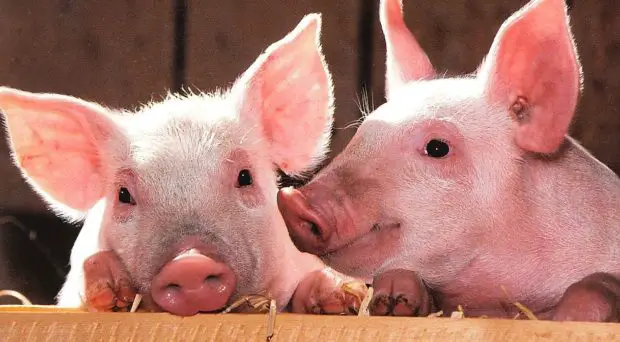Pigs are exposed to a lot of respiratory issues everyday, and the common cough is one of the usual issues that pig owners deal with.
How can you get rid of your pig’s cough? A pig’s cough can be remedied by medication and vaccination. It would all depend on how serious the case is and what’s causing the cough.

Causes of Coughing in Pigs
The chances of your pig getting a cough usually depends on its environment. If you live in or near a pig farm, then there’s a higher chance of your pig getting sick. If you have a single pig and you live in a place that’s far from any hogging areas, then the chances of respiratory issues may also be lower.
But where does this coughing problem really come from?
As long as there is an irritant present in your pig’s respiratory tract, your pig will continue coughing. It’s not just one kind of irritant though, an to figure out how to best get rid of the cough, you would have to find out what the specific cause is first.
Here are some of the most common causes of coughing in pigs:
- Respiratory viruses and bacteria
Swine influenza is one of the most common respiratory diseases that can cause your pig to cough. It is caused by a set of Type A influenza viruses, the most common of which are the trH3N2 virus, the trH1N1 virus, and the trH1N2 virus.
The porcine reproductive and respiratory syndrome (PRRS) is yet another disease that causes pigs to cough. This virus affects pigs of all ages and does not just affect the respiratory system, but also negatively impacts a pig’s ability to breed.
Another common virus that causes coughing is the porcine respiratory corona virus (PRCV). This spreads easily because it is airborne.
As for bacteria that causes coughing, the most common ones are mycoplasma hyopneumoniae, bordatella bronchiseptica, and actinobacillus pleuropneumonia.
- Parasites
Parasites can be found anywhere, especially in the dirt. These are common among pigs and can cause damage to a pig’s body, including its respiratory tract.
The ascaris suum is one common example of such a parasite. Pigs usually ingest the parasite’s eggs. Then, they turn into larvae inside the pig’s intestines, from where they would start to travel around the pig’s body.
When the larvae passes through the lungs, it starts to cause inflammation and infection. This is where the coughing starts. From there, it goes back to the intestines and matures there.
- Inhaled irritants
The air is filled with potential irritants that can cause pigs to cough.
If your pig’s shelter, for example, has poor ventilation, the mix of manure and urine can release a huge amount of ammonia in the air.
Ammonia can be highly damaging to a pig’s airways. In fact, ammonia won’t just start damaging the cells in a pig’s airway, it can also weaken a pig’s respiratory system and make them highly prone to different respiratory infections.
Aside from high levels of ammonia in the air, dust is another irritant that’s commonly found in pig shelters and barns. This dust is not just from airborne dirt, but can also come from old pig feed that has been crushed into powder form.
- Other possible causes
Any problem with a pig’s heart can also lead the pig to get into coughing fits. The moment the heart starts to become inefficient in pumping blood, the lungs will also start to fill up with fluids. This causes a number of respiratory failures, and coughing is usually one of the first symptoms.
Lymphoma is another potential cause, as this is a kind of cancer common among pigs. It affects the lungs, with coughing as one of the many symptoms.
Getting Rid of Your Pig’s Cough
Now that we know what the potential causes are, it’s important to find out what to do next to start getting rid of that cough. Never take your pig’s coughing lightly, because this might be a strong sign that something more serious has to be addressed.
- Have a vet get to the root cause.
Again, the cough itself may not be the main issue. There may be an underlying problem that’s causing your pig to cough. And for you to give the right solution to the problem, you need to know the right problem first.
A specialist would be able to tell you where the problem really is coming from. Don’t just assume automatically that it’s a common respiratory problem like pneumonia, as it could be a parasite or a heart problem.
- Improve air quality in your pig’s shelter.
Ammonia is the main gas released in the air in stuffy barns and shelters with less-than-satisfactory ventilation. You can actually decrease the amount of ammonia that pigs release in their urine or feces by tweaking their diet.
But more than tweaking their diet, it is also important to improve the flow of air inside the barn. You can also add biofilters into the structure to somehow filter out harmful airborne irritants.
Evidently, it is also important to regularly clean the shelter thoroughly. Get rid of old feeds and any form of dirt. Replace the pig’s beddings regularly, especially if you’re using straw.
- Vaccinate against diseases that may harm the respiratory system.
This is more of a preventive measure rather than a cure, but it’s often better to get ahead before the problem comes.
Ask your vet about recommendations he might have on common respiratory diseases and the vaccines that fight against them. Some of the most common pathogens are mycoplasma hypopneumoniae, bordetella bronchiseptica, and actonibacillus pleuropneumoniae.
- Make sure your pig is at optimal weight for its age.
Respiratory issues are often related to cardiovascular issues, and these problems often start when pigs are overweight. The more fat there is in a pig’s body, the harder it becomes for its heart to pump blood efficiently.
Follow the diet your vet has recommended for your pig’s age. Your vet would probably recommend a few supplements as well, depending on your pig’s overall health.
Do not underfeed your pig either. Underfeeding has become a common issue since taking care of miniature pigs became a fad. In an attempt to keep pigs small, some breeders recommend diets that are not nearly enough to provide the pig’s daily dietary needs.
When a pig is underweight and underfed, their immune system is also weak. This means they become more prone to diseases that could affect the lungs.
- Deworm regularly.
You never really know where parasites could be lurking. And because parasites are also potential threats to a pig’s respiratory health, make sure you regularly have your pig dewormed.
It is also important to stay updated about potential risks around your location, especially if you live near hogging areas. Knowing whether parasites, bacteria, or viruses are starting to spread around would help you plan on how to protect your pig.
Other Respiratory Issues Common in Pigs
Here are other respiratory issues common in pigs that you may want to prepare for as well:
- Actinobacillus pleuropneumoniae (APP)
- Bordetella bronchiseptica
- Haemophilus parasuis
- Mycoplasmal (Enzootic) Pneumonia
- Pasteurella multocida
- Porcine reproductive and respiratory syndrome (PRRS)
- Streptococcus suis
- Swine influenza virus (SIV)
Related Questions
Why is my pig breathing fast?
Respiratory issues like actinobacillus pleuropneumoniae (APP), bordetella bronchiseptica and pasteurella multocida can cause labored breathing or panting among pigs. It may also be caused by intense heat, or by lack of water in the pig’s system.
What is swine respiratory disease?
Swine respiratory diseases remain the top cause of death among pigs. These are diseases caused by bacteria, viruses or parasites that attack the pig’s respiratory system. Most of them can be prevented through vaccination.
How is pneumonia in swine treated?
Pigs with pneumonia are usually given injectable antibacterials like Liquamycin LA 200 and Tylan 200. Most of these antibacterials are available over the counter.
